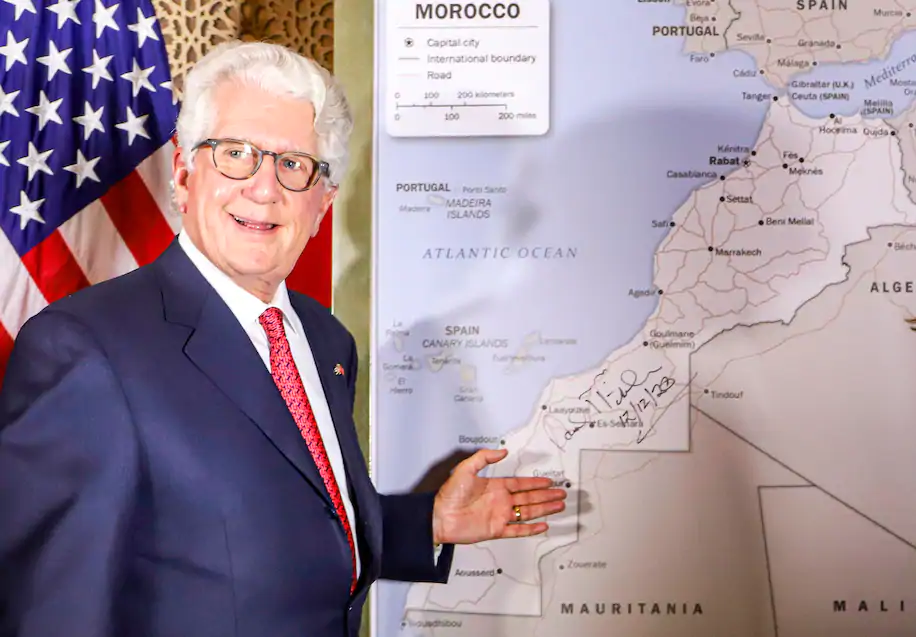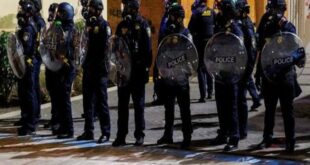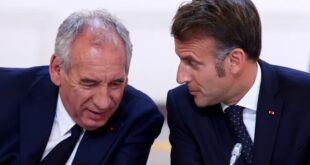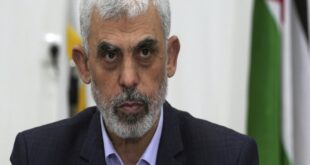You’re reading an excerpt from the Today’s WorldView newsletter. Sign up to get the rest, including news from around the globe, interesting ideas and opinions to know, sent to your inbox every weekday.

“Morocco recognized the United States in 1777,” President Trump tweeted Thursday, invoking a letter circulated by the then-sultan allowing then-rebel Americans “free entry in his ports,” an edict that is sometimes seen as the first act of formal recognition of the United States.
The appeal to history was the prelude to a proclamation. “It is thus fitting,” Trump wrote, “we recognize their sovereignty over the Western Sahara.”
In a series of tweets, he announced that Morocco had joined the growing list of predominantly Arab countries to establish open diplomatic relations with Israel, and in return, it appeared, the United States would formally recognize Morocco’s claims over the disputed Western Sahara region, becoming the only major world power to do so.
Whatever the centuries-old provenance of the U.S.-Morocco relationship, Trump couldn’t obscure modern cynicism over the transaction his government had engineered.
The Trump administration has prioritized strengthening Israel’s diplomatic position in the Middle East, helping burnish right-wing Israeli Prime Minister Benjamin Netanyahu’s credentials as a regional statesman. For years, Morocco’s ruling monarchy maintained friendly yet covert ties with Israel, and Israeli passport holders are already able to obtain visas on arrival in Morocco. Yet the kingdom’s leadership needed a popular national victory, such as U.S. recognition of its Western Sahara claims, to assuage public opinion, which remains opposed to full normalization with Israel.
Morocco annexed Western Sahara, a former Spanish colony, in 1975. That sparked a bloody conflict, which left tens of thousands of refugees stranded in desert camps. A United Nations-brokered agreement in 1991 led to an uneasy truce. Some 38 nations recognize or maintain diplomatic ties with the Sahrawi Democratic Arab Republic, while Morocco’s neighbor Algeria backs and hosts the government-in-exile of the Polisario Front, the armed separatist movement fighting for Western Sahara’s independence.
Even though the United States supported Morocco’s military at the height of hostilities with the then-Soviet-backed Polisario Front, it along with the bulk of the international community maintained a position of neutrality on both sides’ political claims.
That is, until last week. The timing of Trump’s intervention is conspicuous. “Last month, the rebels ended a 29-year-old cease-fire and declared a state of war after they accused Morocco of launching military operations in a buffer zone in the Western Sahara,” wrote my colleague Sudarsan Raghavan. “Morocco said it acted because the rebels were allegedly stopping people and goods, and harassing U.N. peacekeeping troops, which the United Nations later denied.”
It’s unclear to what extent Trump can tip the scales of the current conflict. “What this does is it adds a major world power in support of Morocco’s claims, which is something that Morocco has lacked until now,” said Samia Errazzouki, a former Moroccan journalist and current doctoral candidate who closely tracks the Western Sahara issue, to Raghavan. She added that full American backing of Morocco’s claims complicates hopes for a referendum in the region on its status, as mandated by U.N. Security Council resolutions.
“Without a referendum, it’s going to have an impact on what future steps the Polisario Front and the refugees will take,” Errazzouki said. “And as we have seen in the past few months, war is not off the table.”
There’s no indication yet that other governments will duplicate Trump’s decision. Polisario officials condemned the move, while a statement from the Algerian foreign ministry said it “has no legal effect,” contradicts existing U.N. resolutions about the conflict and “would undermine” international efforts toward producing a “real political process.”
Trump, who is set to leave office next month, may simply be adding to the fires President-elect Joe Biden will try to put out. The declaration “puts the incoming administration … in a bind. Biden could face pressure from members of his own party and foreign allies to walk back U.S. recognition of Morocco’s control over Western Sahara,” noted the Wall Street Journal. “But any reversal of Mr. Trump’s declaration would create friction with both Morocco and Israel, adding to a long list of foreign policy problems Biden must tackle.”
While leaders in Morocco and Israel may hail diplomatic victories, Trump yet again exercised his power to make a determination about land far from the United States in whose inhabitants’ concerns Trump had little to no interest.
“Once again, Trump cedes territory (an executive action on his part without any debate in Congress) which he does not own without even a discussion with, let along an agreement from, the Sahrawi people who have fought long and hard for self-determination,” wrote Nabeel Khoury, a nonresident senior fellow at the Atlantic Council, referring to Trump’s controversial adjudications over the status of territories contested by Israelis and Palestinians. “Trump has once again disregarded three decades of US and UN diplomacy that sought via referendum and consultation to come to a peaceful resolution of the Western Sahara dispute.”
Trump was wrong to abandon thirty years of US policy on Western Sahara just to score a fast foreign policy victory. An Israel-Morocco deal was possible without abandoning US commitment to Sahrawi referendum on WS future, as Sen. Jim Inhofe rightly said. https://t.co/AeVaML1HeQ
— John Bolton (@AmbJohnBolton) December 11, 2020
Some Palestinians and Sahrawis have found growing solidarity in a joint sense of abandonment. “Trump’s announcement will strengthen the bonds of solidarity between the Sahrawis and the Palestinians, who were deceived by the fake Moroccan support for the Palestinian cause,” Nazha el-Khalidi, a Sahrawi activist, told the Middle East Eye.
Ibtihaml Alaloul, a Sweden-based Palestinian activist, told the same website that Morocco’s overtures to Israel ought to disabuse Palestinians of whatever support they believe they have from other Arab nations. It also, in her view, highlights the link between the Palestinian and Sahrawi plight. “If not Palestinians, then who are the main nation who should understand this situation?” she asked.

By Ishaan Tharoor – washingtonpost.com




 World Opinions Débats De Société, Questions, Opinions et Tribunes.. La Voix Des Sans-Voix | Alternative Média
World Opinions Débats De Société, Questions, Opinions et Tribunes.. La Voix Des Sans-Voix | Alternative Média




